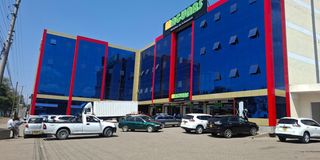Why Nairobi businesses are expanding in Nakuru as local enterprises struggle to survive

Magunas supermarket franchise that opened an outlet in Nakuru earlier this year in Whitehouse area.
When the Ugandan finance minister said, 'Colleagues, money will come!', he may have had Nakuru in mind as the perfect example.
This year alone, Magunas and Kipchimatt supermarkets have opened in Whitehouse and Barnabas respectively, while Carpet City, Unleash (bags) and Muniour (Nail Depot) have set up shop along Kenyatta Avenue. Their arrival is reshaping Nakuru’s streets and encouraging fairer competition.
The city's economy appears to be booming, driven by a surge of popular MSMEs opening branches across the Central Business District (CBD) and bringing services closer to local clients. For some, it seems that the economy is doing wonderfully well.
But not for Nakuru businessmen. For them, it seems that the opposite is happening, as evidenced by the closure of several Nakuru-based businesses.
Over the past two years, Chicken Baristo’s CBD outlet opposite Gilanis Supermarket, D-Mash restaurant, Anne’s Café and Chandarana Supermarket have all left the market.

Munior Cosmetics is a Nairobi-based business that recently opened a branch in Nakuru.
Mtaa Wangu sought an expert’s opinion on this paradox. They hinted that it is less about infrastructure or government regulation, and more about the existing economic structures and bargaining power.
“For many small businesses, there isn’t enough money flowing in, which is why they are closing down. At the same time, you see buildings being constructed, but if you look into it, you will find that most of the investors behind them are not Nakuru residents. They are largely from Nairobi and beyond, taking advantage of the city’s rapid growth,' says Evelyn Wanjiku, a business expert.
She suggests that both the government and private investors recognise the potential of Nakuru’s business landscape, with upcoming infrastructure projects and changing consumer preferences playing a significant part in attracting new investment to the county.

Carpet City is a Nairobi-based business that recently opened a branch in Nakuru.
Ms Wanjiku notes that new trends, such as Airbnb apartments replacing hotels, have transformed the hospitality market. Meanwhile, supermarkets and retail chains are capitalising on Nakuru’s cosmopolitan appeal and its strategic location on the highway linking counties, extending trade even as far as Uganda.
The city’s growth has attracted outside investors who are quick to spot opportunities, while many local businesses continue to struggle with outdated business models.
“Some long-established businesses here have remained rigid and failed to adapt over time. When new players come in and offer what customers want, the market naturally shifts. As new businesses cater to their customers' dynamic needs, driven by their feedback, existing businesses must keep re-evaluating and innovating if they want to survive,” says Wanjiku.


